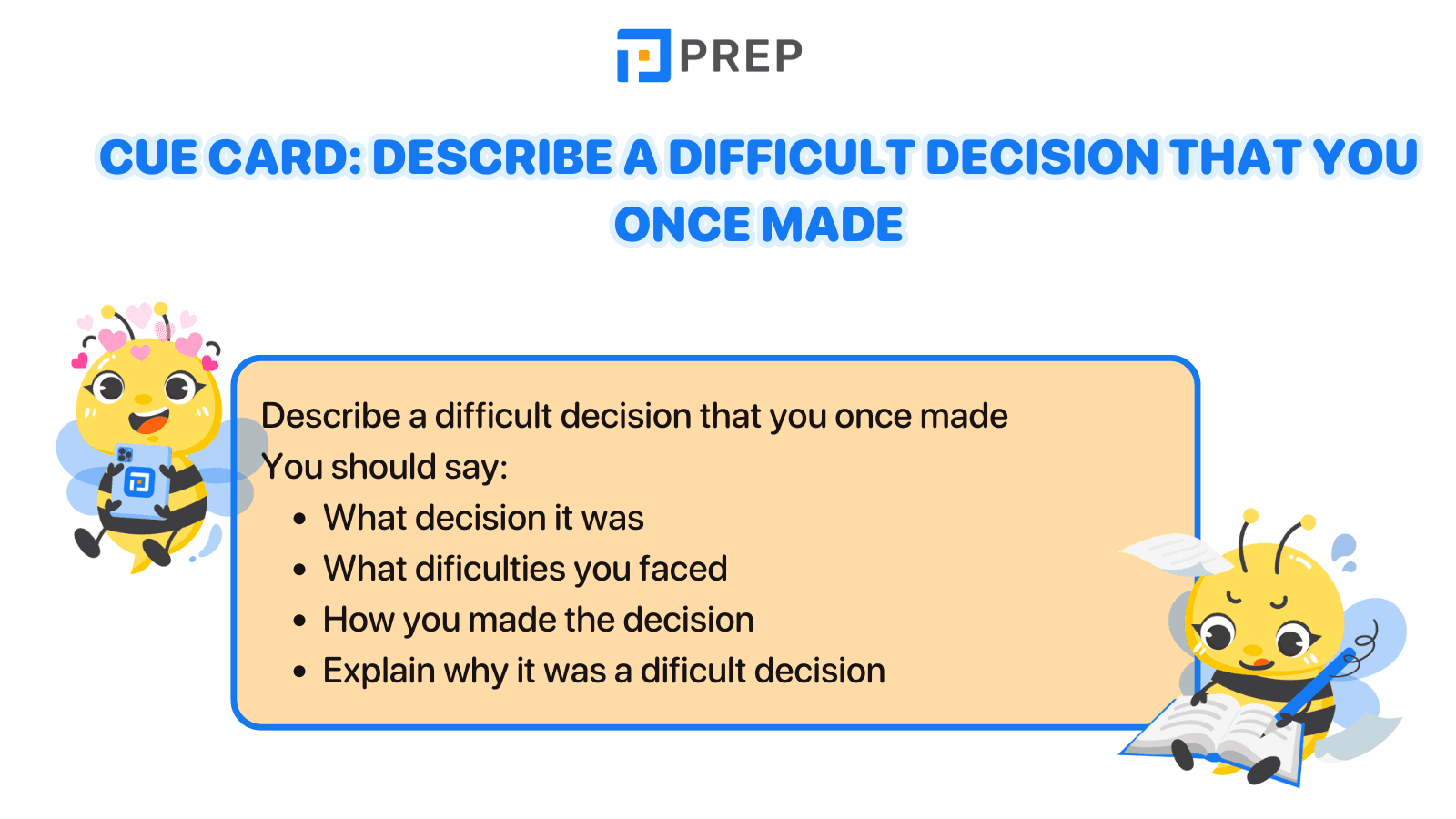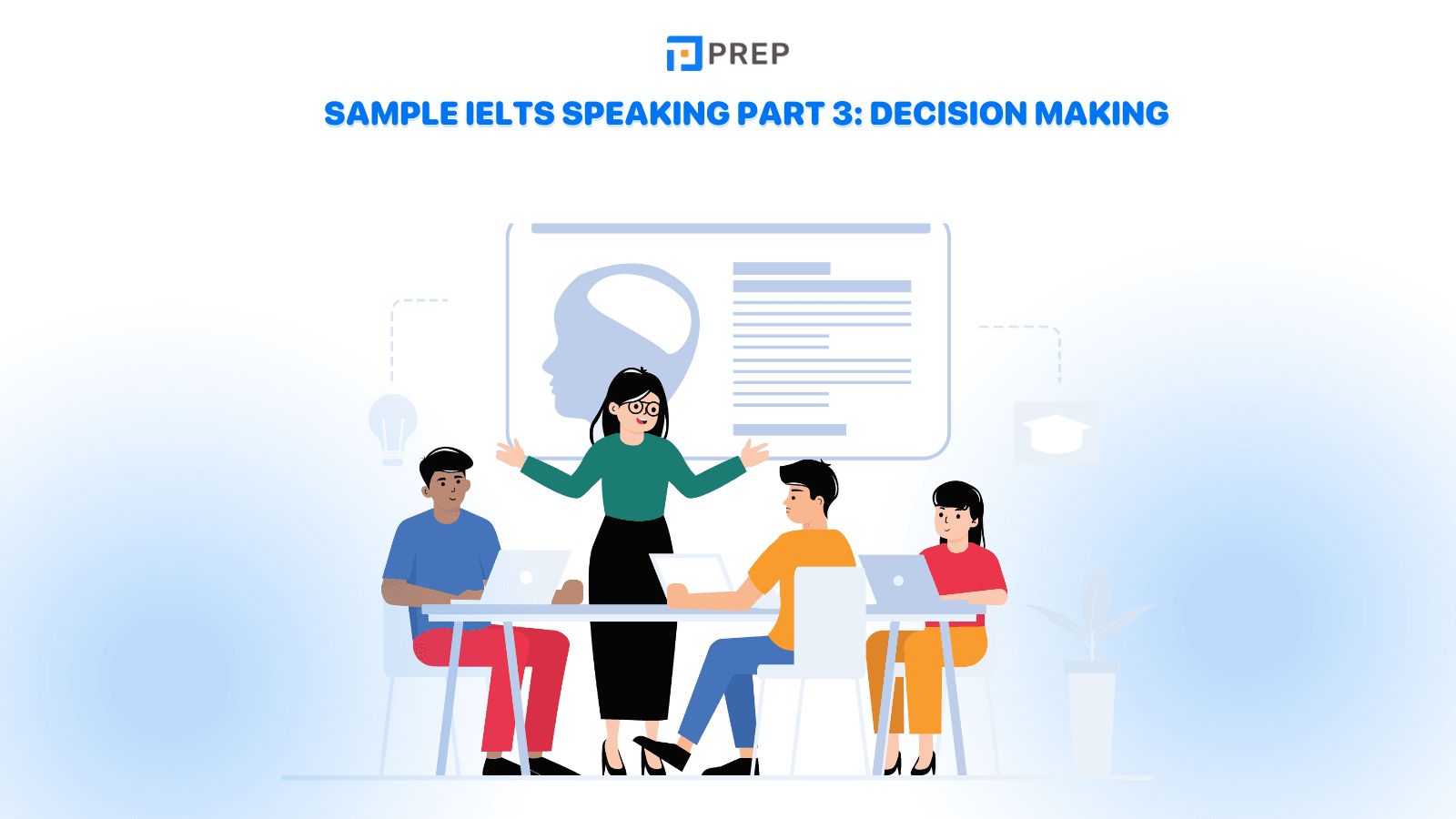Sample Speaking Part 2, 3: Describe a difficult decision that you once made
The topic “Describe a difficult decision that you once made” belongs to the "Describe an experience" category. This is a familiar topic for candidates, but to make the speech more engaging and authentic, you need to know how to incorporate your personal story into the exam naturally.
Let's refer to the sample IELTS Speaking Part 2 + 3 on the topic "Describe a difficult decision that you once made" at prepedu.com to effectively prepare and study for the IELTS exam, and don't forget to save the useful vocabulary for your gradual learning!

I. Sample IELTS Speaking Part 2: “Describe a difficult decision that you once made”

"Describe a difficult decision that you once made" is an extremely interesting topic in the process of learning English for the IELTS Online exam for each candidate. So, how can you quickly and effectively "decode" this topic? Let's take a look and find it out!
1. Cue card: Describe a difficult decision that you once made
Describe a difficult decision that you once made:

2. Outline: Part 2
|
What the decision was |
What difficulties were faced |
|
|
|
How the decision was made |
Conclusion |
|
|
3. Sample Speaking Part 2: Describe a difficult decision that you once made
Let's listen to the sample podcast for IELTS Speaking Part 2 - "Describe a difficult decision that you once made."
If I’m to talk about a difficult decision that I remember making, I’ll definitely pick the gym membership that I purchased a couple of months back. I really had to think everything through before coming to that decision, because I also wanted to own a new laptop then. My computer had seen better days and its poor performance was barely tolerable. But there was no running away from the fact I could only afford either the pass to the health club or the PC.
In the end, I went with the gym card for my health’s sake. My weight had been ballooning, which was why I even thought of going to a health club in the first place. The club that I set my eyes on offered me an additional year of access to its facilities if I bought the pass, and you could imagine this really helped me to decide. I’d have to keep using my decrepit laptop for a while, though.
I always felt that was a tough decision as no matter what I chose to buy, it would be a significant expense. Money doesn’t grow on trees and my dilemma occurred at a time when prices were hiking across the board. Nevertheless, I’m glad that I was able to make the correct choice, because now I’m in good health and I feel very much in shape.
Some useful vocabulary used in the sample IELTS Speaking Part 2 on the topic "Describe a difficult decision that you once made":
-
Think sth through: carefully consider something
-
Seen better days: in a state of decline or deterioration - used in the past tense
-
Tolerable: acceptable, bearable
-
Balloon: expand or inflate
-
In the first place: from the beginning
-
Set eyes on sth: notice or pay attention to something
-
Decrepit: old and in poor condition
-
Dilemma: a difficult situation or problem
-
Price hike: an increase in prices
-
Across the board: affecting all, universally
For more information, please refer to the following article:
II. Sample IELTS Speaking Part 3: Decision Making
Let's listen to the sample podcast for IELTS Speaking Part 3 - Decision Making.

1. Why do some people find it hard to make decisions?
From my point of view, most of the difficulty actually stems from having too many options. When people have an excess of choices, they might get caught up in picturing the outcome of each one, and as a result, they’ll have a hard time deciding on the one that achieves the best result.
-
Caught up in sth (adj.): distracted or preoccupied by something
-
Picture sth (v.): imagine or visualize something
-
Have a hard time V-ing (v.): struggle or find it difficult to do something
2. How important is it to get advice from other people when making decisions?
It’s rather important, and arguably even more so if someone hasn’t been used to coming up with their own decisions. Still, if you find yourself always consulting others then I think you’re a tad too preoccupied with maximizing the benefits of every activity. It’s simpler to follow your heart on some decisions, because not all of them are gonna be life-and-death.
-
A tad (n.): a little bit (similar to "a bit")
-
Preoccupied (adj.): busy or distracted
-
Maximize sth (v.): optimize or make the most of something
-
Life-and-death (adj.): of crucial importance or urgency
3. What are some of the most important decisions young people have to make?
Choosing what to do next after graduation from high school or university springs to mind. I think many young people are aware that if they make the wrong choice, it might result in several years of their lives down the drain. Having a carefree mindset will ease a lot of worries but it’s not always easy to be happy-go-lucky if your resources are constrained.
-
Spring to mind (v.): come to mind or appear in one's thoughts
-
Down the drain (adj.): wasted or lost
-
Carefree/happy-go-lucky (adj.): lighthearted or without worries
-
Constrained (adj.): restricted or limited
4. Do you agree that parents should make important decisions for their children?
Well, I agree, to an extent. Parents need to be the decision makers for their children before the youngsters reach adulthood. However, moms and dads also ought to be prepared to hand the agency back to their children as far as the offspring’s adult life decisions are concerned. The last thing you want is for your son or daughter to resent you for forcing them into something they aren’t fond of.
-
Decision maker (n.): a person who makes decisions
-
Hand back sth (v.): return or give back something
-
Agency (n.): the power or right to make decisions
-
The last thing (sb wants/needs) (n.): something that someone does not want or need
-
Resent sth (v.): feel anger or bitterness towards something
This article has provided a sample for IELTS Speaking Part 2 + 3 topic "Describe a difficult decision that you once made" written by teachers at prepedu.com. Wish you effective studying and success in achieving high scores in the upcoming real-life Speaking test!

Hi I'm Chloe, and I am currently serving as an Product Content Administrator at Prep Education. With over five years of experience in independent online IELTS study and exam preparation, I am confident in my ability to support learners in achieving their highest possible scores.
Comment
Premium content
View allPersonalized roadmap
Most read












